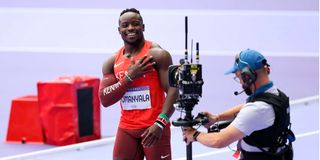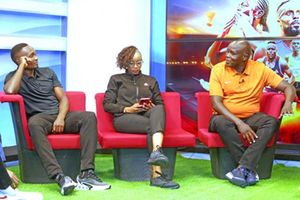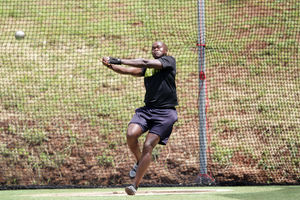
Ulinzi Sports Complex running track gets fresh marking on Sunday ahead of this Saturday’s Absa Kip Keino Classic meeting.
What does it take to successfully organise the Kip Keino Classic meet, now in its sixth edition?
A stadium, for starters. With the well documented struggles of the country to renovate its two top facilities – Moi International Sports Centre and Nyayo Stadium – organisers of the Kip Keino Classic have been working at breakneck speed to ensure the recently chosen alternative – Ulinzi Sports Complex in Langata, meets the minimum standards set by World Athletics to host an international event.
The Kip Keino Classic is part of the World Athletics Continental Tour Gold events, the second-tier league of global meets, below the 15-series Diamond League.
There are 20 Continental Tour Gold meets in the world this season, including two in Africa -- Kip Keino and Botswana Golden Grand Prix.
Beyond the battery of workers at Ulinzi Sports Complex racing to get the venue all spick and span, there is an army of dedicated people who have ensured the meet is staged successfully these past five years.

Ferdinand Omanyala of Kenya celebrates after winning Heat 2 in the 100m men's race at the Stade de France, Saint-Denis, France on August 03, 2024.
According to Meet Director Barnaba Korir, 877 personnel are directly involved in helping to deliver the event, with an additional 300 working as volunteers, making a total of 1,177.
They will be working all this week in various sections, including event management, technical, hospitality, media and television, medical, protocol, transport, secretariat, ticketing and security.
The key event of course, is the competition on track and on field at Ulinzi Sports Complex, and invariably, the technical section has the most personnel at 250. These include the competition director, judges, technical officials, etc.
Media and television has about 100 people. All editions of the Kip Keino Classic have been broadcast live, with real-time results and reports relayed online.
Security people working directly for the event are 200, including the Kenya Police and the National Youth Service. Additional security to handle the crowd and shadow VIP guests – men in black if you like- are 50.

Africa’s fastest man Ferdinand Omanyala exchanges notes with World Athletics’ Media Services Manager Tania Evasque at a World Athletics Media Development Programme Workshop in Rabat on May 23, 2025 ahead of Sunday’s Rabat Diamond League athletics meeting.
All these personnel must be paid, transported, fed, and accommodated if need be.
Last week, the government gave Sh300m for the event, while Absa Bank has a naming rights sponsorship of Sh28m.
“We thank the government and Absa for the sponsorship. Running this event requires a lot of resources, which we struggle to get,” said Korir.

Running track during the launch of Ulinzi sports complex on April 13, 2022.
Some 186 guests for this edition, officials and support staff, have to be flown in and accommodated for at least four nights by the organisers.
“We pay no less than Sh12 million for accommodation -- in dollars. In 2023, because of the weak shilling, we ended up paying Sh52 million in accommodation for the athletes. We, in fact, ran a deficit of Sh100m and had to seek government support,” the meet director volunteered.
To have the best event, you must bring the best athletes. Kip Keino Classic has consistently invited mega global stars the likes of American sprinters Kenny Bednarek, Fred Kerley, and Sha'Carri Richardson, Jamaican track queen Shelly-Ann Fraser-Pryce, Moroccan steeplechase king Soufiane El Bakkali, Motswana wonderboy Letsile Tebogo – just to name a few, and the gaggle of Kenyan world beaters, who all negotiate for an appearance fee paid in dollars.
“I can tell you as a fact that the major global stars have a standard appearance fee demand set by World Athletics. Usain Bolt used to have an appearance fee of $300,000 (about Sh38.8 million). I won’t reveal what we pay, who we pay, for privacy reasons, but you can see it is not pocket change,” said Korir.
Athletes, irrespective of having their medical cover, are insured by the meet organisers.
Competitors earn prize money depending on how they perform.
For the Core events, winners pocket $5,000 (Sh645,950), runners up $3,000 (Sh387,570), second runners up $2,000 (Sh258,380), fourth place $1,400 (Sh180,866), fifth $1,200 (Sh155,028) to 12th finisher who walks away with $250 (Sh32,297).
Winners in the Discretionary category earn $3,000, runners up $2,000, and third-placed finishers $1,200, all the way to position 12.
Kip Keino Classic will feature 15 field and track events. Core events are hammer throw, 200m, 100m, 800m, and 400m hurdles.
Sadly, because of the inadequacy of the stadiums in Kenya that do not have modern, inbuilt communication infrastructure, the hiring and setting up of timing and broadcast equipment incurs a hefty bill running into millions.
Belgium-based manufacturer of professional sports timing systems, Timetronics and Microplus, will ensure all records are captured and certified at Ulinzi Sports Complex.
Nation Media Group’s NTV will exclusively broadcast the meet live to the Kenyan audience.
Organisers will, meanwhile, mount two big screens at the stadium, set up hospitality for the event’s official guests numbering 700, and ensure spectators safely access the stadium and experience an enjoyable event.
Some 8,000 tickets are on offer, retailing at Sh2,000 VIP and Sh200 regular.
Come one, come all!






